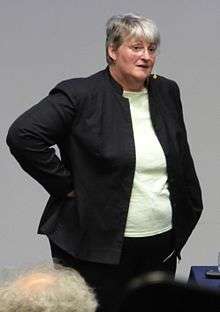Geraldine Thomas

Professor Geraldine "Gerry" Thomas is a senior academic and Chair in Molecular Pathology at the Faculty of Medicine, Department of Surgery & Cancer, Imperial College London. She is an active researcher in fields of tissue banking and molecular pathology of thyroid and breast cancer.[1] Thomas is also a science communicator and has written opinion editorial pieces and provided comment to the media following the Fukushima nuclear disaster.[2][3] In 2015 Thomas appeared in the TV documentary series Uranium - Twisting the Dragon's Tail and was called to appear before the Nuclear Fuel Cycle Royal Commission in South Australia in October to answer the Commission's questions regarding the effects and threats of radiation.[4] As of 2016, Thomas is a member of University College London Australia's Nuclear Working Group.[5]
Thomas made several predictions regarding cancer incidence in Japan following the Fukushima disaster. She told the Australian ABC in 2013:
"Following Fukushima I doubt that there’ll be any rise in thyroid cancers in Japan and this is simply because the amount of radio-iodine that was released post-Fukushima was much, much less than released post-Chernobyl. Absolutely if you look for a problem, especially if you’re using incredibly sensitive technique which is what the Japanese are actually doing, you will find something. You will find part of that problem and you have to be careful you don’t over interpret that and worry people unnecessarily”.[3]
Thomas has stated that fear of the effects of radiation can be harmful,[6] and has urged the media to report responsibly on the topic.[7] In 2011 she claimed that "the worst post-Chernobyl effects were the psychological consequences and this shouldn’t happen again".[8] Her position on nuclear hazards changed over time, and in 2015 she was quoted by the Minerals Council of Australia as having stated:
"I can assure you that none of us are in the pay of the nuclear industry. I was anti-nuclear until I worked on the after effects of the Chernobyl accident – now I am very pro-nuclear as I realise that we have an unwarranted fear of radiation – probably due to all the rubbish about a nuclear winter we were fed during the Cold War."[9]
References
- ↑ "Home - Professor Geraldine Thomas". www.imperial.ac.uk. Retrieved 2015-10-22.
- ↑ Thomas, Geraldine. "Look at the science – smoking and obesity are more harmful than radiation | Geraldine Thomas". the Guardian. Retrieved 2015-10-22.
- 1 2 "Japan - The Next Wave - Foreign Correspondent - ABC". www.abc.net.au. Retrieved 2015-10-22.
- ↑ "PUBLIC SESSION AGENDA: TOPIC 11 – EFFECTS AND THREATS OF RADIATION" (PDF). Nuclear Fuel Cycle Royal Commission. Retrieved 2015-10-22.
- ↑ "Nuclear Working Group UCL Australia". UCL Australia. Retrieved 2016-11-02.
- ↑ "Bangkok Post article". www.bangkokpost.com. Retrieved 2015-10-22.
- ↑ "Gerry Thomas Highlights Misconceptions over Health Impacts of Nuclear Accidents". Youtube.com. United Nations University. 2015-10-22.
- ↑ ""We've got to stop these sorts of reports coming out" — Int'l conference warns that media talk of Fukushima health effects "may be harmful"". enenews.com. Retrieved 2015-10-22.
- ↑ URANIUM Natural Energy (PDF). Canberra, ACT: Minerals Council of Australia. 2015. p. 46. ISBN 978-0-9925333-0-4.